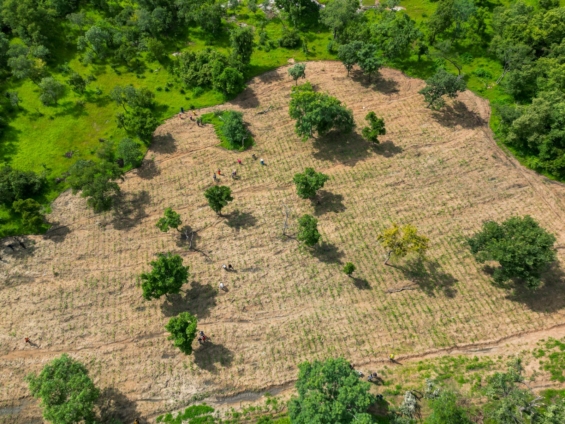The Adaptation Gap Report 2024: Come Hell and High Water has urged countries to significantly ramp up their climate adaptation measures, with a particular focus on securing financial commitments at COP29.
The most recent data from UNEP’s Emissions Gap Report warns that, without urgent and substantial reductions in greenhouse gas emissions, the world is on track for a devastating global temperature rise of 2.6-3.1°C by the end of this century.
Ahead of the COP29 climate talks in Baku, Azerbaijan, the report highlights the pressing need to drastically accelerate climate adaptation efforts over the next decade in order to cope with the growing impacts of climate change.
However, this push is being hindered by a significant gap between the financial resources required for adaptation and the current levels of international public finance allocated to these efforts.
In a video message, UN Secretary-General António Guterres stated that the climate crisis is devastating public health, deepening inequalities, undermining sustainable development, and shaking the very foundations of peace.
"The vulnerable are hardest hit. And taxpayers are footing the bill. While the purveyors of all this destruction – particularly the fossil fuel industry – reap massive profits and subsidies."
Executive Director of UNEP, Inger Andersen, emphasized that climate change is already wreaking havoc on communities worldwide, especially those that are poorest and most vulnerable. She highlighted how intense storms are destroying homes, wildfires are ravaging forests, and land degradation and drought are damaging vital landscapes.
“People, their livelihoods and the nature upon which they depend are in real danger from the consequences of climate change. Without action, this is a preview of what our future holds and why there simply is no excuse for the world not to get serious about adaptation, now.”
International public adaptation finance to developing countries rose from US$22 billion in 2021 to US$28 billion in 2022, marking the largest increase—both in absolute terms and relative percentage—since the Paris Agreement. This increase aligns with the goals of the Glasgow Climate Pact, which called on developed countries to at least double their adaptation finance to developing countries from around US$19 billion in 2019 by 2025. However, even if this target is met, it would only reduce the adaptation finance gap—currently estimated between US$187 billion and US$359 billion per year—by about 5 percent.
As developing countries face escalating losses and damages from climate change, they are also grappling with growing debt burdens. This makes the need for effective and equitable adaptation efforts more urgent than ever.
The report urges countries to raise their ambitions by committing to a robust new collective climate finance goal at COP29. It also calls for stronger adaptation measures to be included in their upcoming climate pledges, or nationally determined contributions, which are due early next year ahead of COP30 in Belém, Brazil.
Given the scale of the challenge, the report stated that, closing the adaptation finance gap will require innovative strategies to mobilize additional resources. Both public and private sectors will need new approaches, financial tools, and stronger enabling factors to unlock the necessary adaptation funding.
For the public sector, enabling factors include the establishment of dedicated funds and financing mechanisms, climate-sensitive fiscal planning, climate budget tracking, and integrating adaptation into national development plans and medium-term financial frameworks. These efforts, according to the report, could be further supported by reforms to international financial institutions and multilateral development banks.
For the private sector, enabling factors involve new strategies and financial instruments designed to reduce the risks for private investment by leveraging public funds. This could be facilitated through adaptation accelerators and specialized platforms.
References to the need for capacity building and technology transfer are widespread in UNFCCC documents, particularly concerning water, food, and agriculture. However, efforts to address these needs are often fragmented, costly, and short-term in nature.
Additionally, there is limited evidence that these initiatives are reaching marginalized and underrepresented communities. Several factors undermine the effectiveness of technology transfer, with the most common being economic and financial barriers, such as high initial investment costs, challenges in securing loans, and the need for more supportive domestic policies within legal and regulatory frameworks.
The report offers several recommendations for improvement, emphasizing that interventions should leverage existing capacities, strike a balance between technological solutions and the enabling conditions required, and prioritize gender equality and social inclusion.
It also highlights the need for a stronger evidence base, including data from monitoring and evaluation, to assess capacity and technology needs, identify effective approaches, and understand their true costs.
Capacity-building and technology transfer plans should be designed to support adaptation across different sectors, scales, and development priorities.
Adaptation strategies should be developed with a comprehensive understanding of needs, rather than focusing solely on promoting specific technologies, and should be integrated into broader development frameworks.
Latest Stories
-
The Law Enforcement Craze for TV Stations
2 mins -
GFA dissolves Black Stars Management Committee after AFCON qualification disappointment
3 mins -
The Thomas Partey Tournament: Empowering Ghana’s Youth through football
39 mins -
Nana Akomea calls for public inquiry into ‘expired rice’ saga
57 mins -
Maintain Otto Addo despite AFCON 2025 no-show – Nana Akomea advises GFA
59 mins -
GFA issues apology to Ghanaians for Black Stars failure to qualify for AFCON 2025
1 hour -
Nautyca releases new single ‘Nalani’
1 hour -
Ablakwa slams Chief of Staff for ‘whitewashing’ ‘expired rice’ for SHS scandal
2 hours -
Regulators of financial institutions urged to develop policy framework for climate financing
2 hours -
Akufo-Addo: New BoG HQ to enhance reform capacity and investment climate
2 hours -
DRIP initiative improves over 80km of roads in Greater Accra, says RCC
3 hours -
Akufo-Addo to commission over 80 educational projects today
3 hours -
Police to set up Election Task Force Briefing Centre for 2024 polls
3 hours -
AFCON 2025: GFA to apologise to Ghanaians for Black Stars failure
3 hours -
Justice Yonny Kulendi urges Accra Business School graduates to lead with integrity
3 hours

